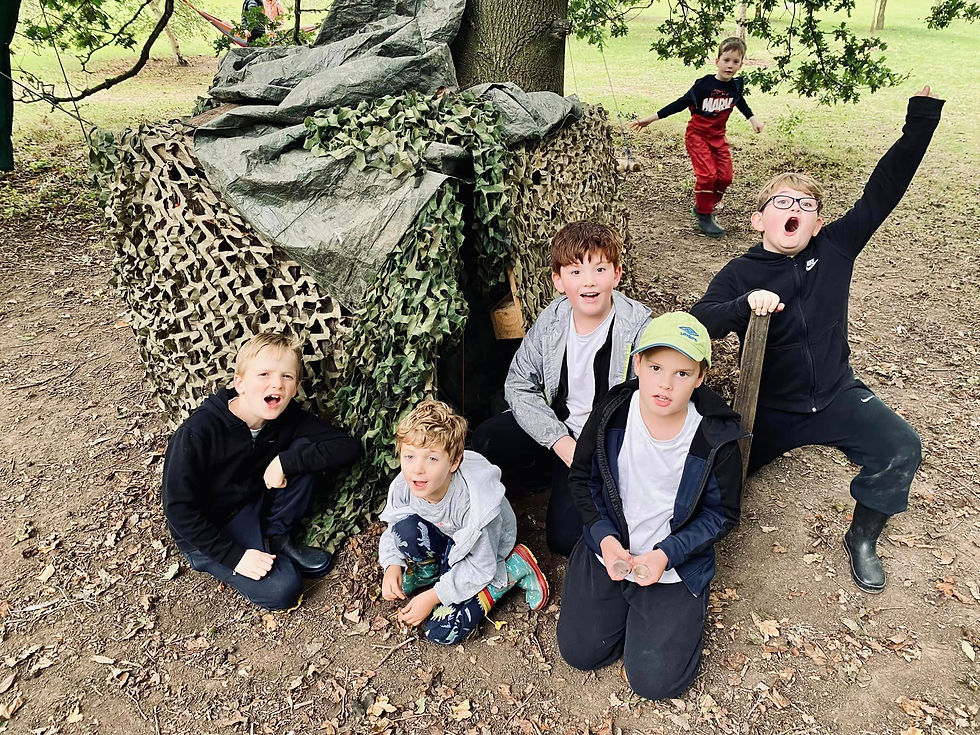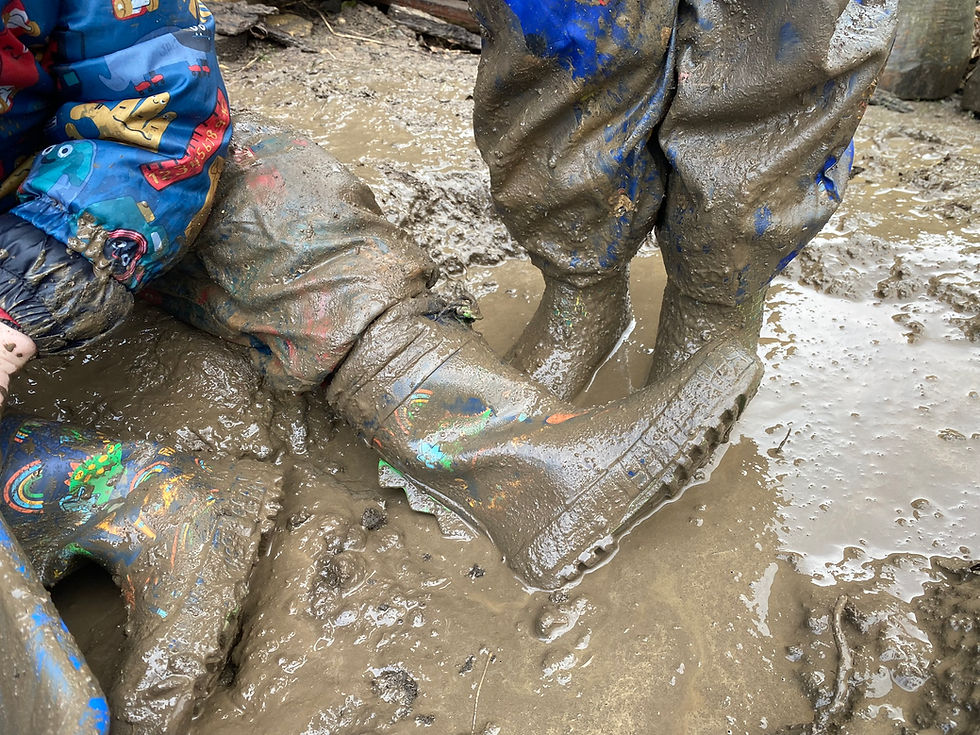The Value of Free Play
- Mr Mud

- Oct 9, 2023
- 5 min read
Taking back childhood and enhancing development through unstructured play
Let me start this post with a wide open question, allow yourself a few moments to consider the answer before you read on. The question is, what are some of your fondest memories from your childhood?

Now I’ll go first, and I’ll try not to blur my actual memories with the plot lines of adventure movies like ‘The Goonies’ and ‘Stand by Me’ because, as far as I was concerned back then in the 80’s, every day was an opportunity for a new adventure! Up and out after breakfast, on my bike, knocking for my mates and then heading off to some scrap of woodland to build dens, climb trees, jump rivers, light a campfire to cook toast (lunch), and otherwise live a life somewhat akin to a William Golding novel, but without Piggy and the Conch. The call of the wild was real, but was it the wilderness that drew us or was it the freedom?

Now it’s your turn, what sprung to mind when I asked that question? I’ll bet my hat there was at least one, probably more, that involved unstructured, unparented, wild play - and even more probably with a little risk involved, even if that risk was being caught just a little further from home than you should have been? But more than likely you fell out of a tree or two, got a puncture on your bike miles from home and had to walk it back, or the small fire you lit got a little bigger than you expected!
When I began researching for this blog I sat down at Google maps and tried to plot out my roaming radius, I was shocked, my mates and I would be upto 3 miles (5Km) from home on our adventures, and this was at primary school age! I can tell you that my two eldest children who are now 25 and 23 with children of their own, I never let them go that far and put themselves at such risk… but they still did, of course.

Today things are very different. Let me assure you that I am not about to head off on a tangent about kids not being allowed out because of all the dangers that lurk beyond the front door, to an extent I agree, or about the reliance on technology and noses being pressed to screens, it’s 2023, there is much value in said technology (he says from behind a screen and keyboard) that’s the way things are. My point is, how can we still give children the valuable unstructured, mud filled, higher risk, exciting times that really push their limits, fuel their self confidence by showing them what they are capable of achieving and teach them that failure is also cool and that the journey matters as much as the destination, how do we give them that real childhood WOW! factor that sparks their interest in things they may have never dreamed of? Forest School is how.
What is Forest School? (and also, what it isn’t)
Forest School is NOT outdoor learning. It is not a structured lesson delivered outdoors. There are no set or expected outcomes. There is no pressure on the learner to achieve or attain or be measured. One cannot fail or do poorly at Forest School.
Forest School is learner led unstructured play in a natural environment. It is freedom from conformity, It’s messy, it’s risky, it’s busy, it’s loud, it makes you smile when you see it in action, it takes you back to those days when you fell in the lake trying to catch newts, it is everything a child needs in order to learn about social interaction, teamwork, the environment and importantly - themselves. Thus it is not just play that happens here, the Forest School ethos supports childhood development by giving them opportunities to explore their interests, push their comfort zones, and build self reliance, self confidence and self esteem at every step of the way. It is that missing component of childhood delivered in a time when it would otherwise, almost, not be possible. And it is a deliberately inclusive and supportive environment for all children including those with special educational needs or disabilities. And I especially love working with the latter, the neuro-spicy ones, those with ASD and ADHD and other hidden disabilities who I often find myself being kindly informed about at the beginning of a term, the ones who ‘play up’ or ‘act out’ in class. They absolutely excel in the non-conformity of Forest School and I know exactly how they feel and why they enjoy that environment because I am one too, a neuro-diverse adult with ADHD.
A (brief) introduction to child psychology
I’m a Forest School Leader, I also hold qualifications in environment and climate change and in children and young people’s mental health, and I teach children daily methods such as mindfulness to support their mental health. I am not, and I am very far from being, a child psychologist or a child development specialist. However I am aware of the Maslow Bloom Theory because I see it happen with my own eyes every day. The phrase "Maslow before Bloom" is often heard in education circles. The phrase tries to tell us that as humans our basic needs have to be met before higher order thinking and academic learning can take place. The phrase comes from two 20th century American psychologists, Abraham Maslow and Benjamin Bloom. Abraham Maslow (1908-1970) coined the "Hierarchy of Needs" which categorises human needs into five tiers. These tiers include Physiological, Safety, Belonging, Esteem, and finally Self-actualization.
Benjamin Bloom, another 20th century American psychologist (1913-1999) coined The Bloom’s Taxonomy i.e. a ladder of verbs that organize higher- and lower- levels of cognitive skills for learning. These verbs are organized into cognitive tiers labelled knowledge, comprehension, application, analysis, synthesis, and evaluation.
Maslow’s two lowest tiers physiological and safety needs involve our most basic needs such as food, water, shelter, as well as security to relax socially and financially. These levels extend to things like sleep, clean air, exercise, clothing, warmth, and other physical or bodily needs. Those without these basic necessities or without a space to relax without fear of physical or mental stress, may find this keeping them from Bloom’ing at school.

Forest School delivers Maslow in spades! Children who attend regular Forest School sessions develop confidence and curiosity, learn what inspires them, where they fit in, how to keep themselves safe and so much more. And these things have a ripple effect which benefit their capabilities back in the classroom and there have been many studies published over the years to evidence that, this one makes a very interesting read.
And so Forest School, along with other opportunities for unstructured, unparented, unobserved play, can ultimately have the most profoundly positive impact on a child's development in the classroom by giving them access to the tools they need to thrive. If your child's school doesn't offer Forest School during term time you can book one of our holiday camps. If you represent a school which would like to offer regular Forest School sessions, please drop us a message for a chat.
Stay muddy!
Mr Mud







Comments